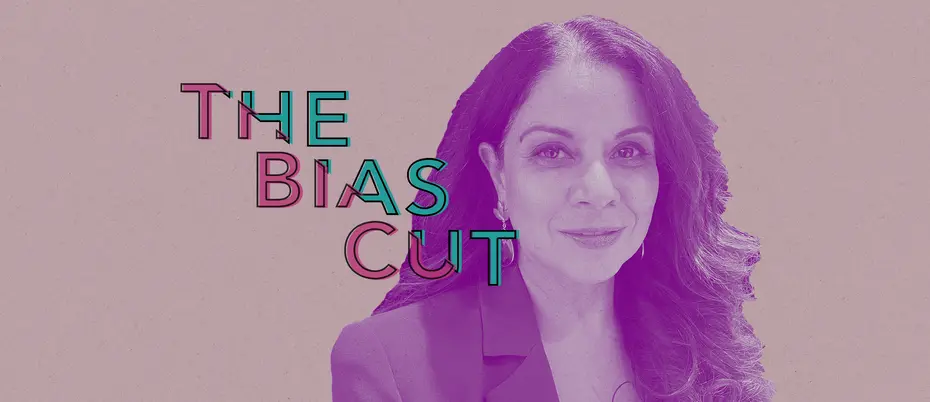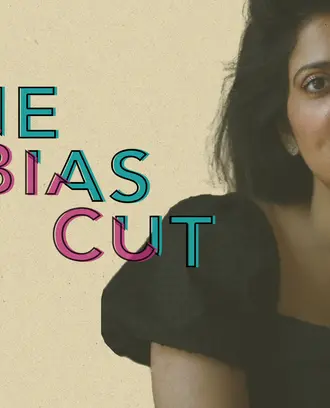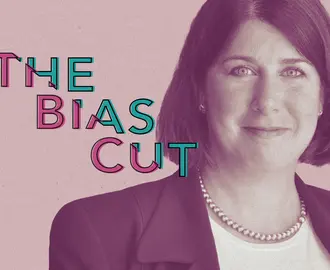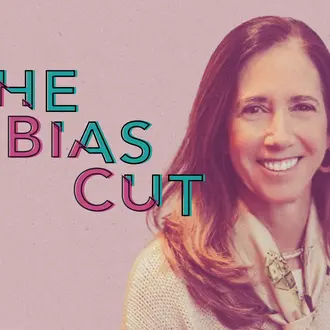The Bias Cut
Why this data executive prioritizes ‘relationships, results, and reach’
“As a thoughtful introvert, I’ve learned that I must carve out time for intentional, purpose-driven professional networking in a balanced manner.”
A 2021 women’s leadership study from LeanIn.org and McKinsey & Co. found that American women held 41% of corporate management positions, and women continue to fight underrepresentation when it comes to board positions and CEO roles. They also face gender bias, harassment, and opposition to their management styles.
Here’s how one MIT Sloan alumna has pushed back on those statistics and used what she’s learned along the way to help those behind her.
Andrea de Souza, MBA ’13, global head of data sciences and engineering, Eli Lilly and Co.
Who was an ally or mentor for you as you’ve navigated your career? How did they specifically help you get to the next level of your professional development?
Michael Foley, who leads discovery and development for health care investment firm Deerfield Management Co. He is the mentor that has advocated for and led me to be better, do better, and believe in myself. At the Broad Institute, he provided me the opportunity to lead for his division. He routinely challenged me to take more calculated risks and provided a psychologically safe space to have incredibly tough conversations around the challenges women face in leadership roles.
Recently with his sponsorship, I had the privilege to participate in the Deerfield Break into the Boardroom program. As an immigrant who came to America at 13 and put herself through school through a combination of scholarships and simultaneous jobs, this was an incredible opportunity that is opening new doors. Mike continues to serve as this constant voice for women in leadership — to challenge both the conscious and unconscious bias we experience.
Can you give an example of a time when you’ve experienced or witnessed gender bias? How did it affect you professionally? What impact did it have on your job?
Whether it is the derogatory slurs — I beat all the sales records because I “looked great in skirts” — the labels including “being a nice bitch,” or asking technical women to do more administrative work, all of these events create scars and wounds that take time to heal. The larger challenge was often that the senior female leaders in charge did not stand tall and create a safe place for women to thrive.
Perhaps the biggest lesson I have learned is that while it is often difficult to take the high road and walk away, in time the system catches up with the bad actors.
What is the most difficult lesson you’ve learned in your professional life? In what unexpected ways did you grow from it?
At two different points in my career, in order to build capability and take calculated risks, I’ve had to take large steps back, despite surpassing in record time what my male peers had accomplished. I continue to wonder: Why does this pattern still exist? How can we leverage sponsorships of women to enable advocacy for equity?
Perhaps the way in which I have grown is to take all the unintended unconscious bias and to continue to model behaviors that will set the stage for women helping each other grow professionally and with intent to encourage male allyship.
What’s one way that you tend to your wellbeing and how do you encourage wellbeing among your staff?
I’ve been working toward becoming a Gyrotonic instructor, an exercise methodology developed in Germany that integrates breath and movement through spiral articulation of all the joints in the human body. This method, once affectionately referred to as “yoga for dancers,” is tough and requires a lifelong commitment. It helps me manage my osteoarthritis which as I age tends to misbehave more often.
For my staff, we lead several of our meetings with a shared accountability approach where we share wellbeing moments of the week, for example, prioritizing annual preventative checkups as a birthday present to myself. Just the gentle reminder of asking has set the stage for prioritizing wellbeing as part of our leadership development.
What’s one skill or behavior women can adopt to make their career path more successful and more manageable?
As a thoughtful introvert, I’ve learned that I must carve out time for intentional, purpose-driven professional networking in a balanced manner. Introverts find networking draining and given how much learning happens through networking, striking the right balance is key.
A toolbox I use is: relationships, results, reach. Cultivate and develop a set of relationships that deliver results that align with your reach goal.
If you could snap your fingers and change one thing about workplaces, societal norms or public policies that would most benefit women in the workforce, what would it be?
Level the playing field and redesign the entire system for men and women, starting with balancing the number of men and women in executive leadership roles. It will make a huge difference.
Read: It's time women get credit for 'invisible work'




